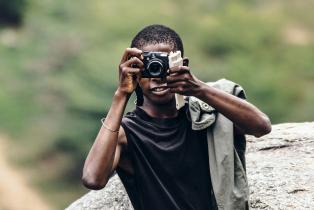

AUTHOR: JESS CROMBIE RACHEL ERSKINE IVY LAHON NATALIE LARTEY JANICE NJOROGE KATE MCCOY
Fighting systemic racism in humanitarian aid and development work is critical, but it will take time and pathways to lasting change are likely to be complex.
The co-chairs of the Bond People in the Pictures Group and panellists from the group’s recent webinar on racial representation in development share their views on why representation is an important place to start and offer some pointers on how to make change happen. Find the full webinar here or read the session notes here.
During the session there were questions raising important points with which the sector is contending and confronting. Here we address some of these questions and provide our thoughts for moving towards better representation in your communications and fundraising.
A: Yes, we do. Systematic racism in development is much bigger than representation. However, the process of identifying how narratives of white superiority and black inferiority play out in development has the potential to open up discussions on the bigger topics. Issues like power imbalances within partnerships, lack of people of colour in leadership and accountability roles, and biases about who holds knowledge can all be explored when we look at how racialised narratives in development shape our practice.
Identifying what is missing from NGOs’ storytelling can also increase awareness of some of the big issues of racism the sector needs to address. Colonial policy made significant contributions to the poverty and inequality we see in the world today – narratives that acknowledge this legacy are missing from our storytelling. Including this “inconvenient truth” into mainstream development narratives serves two purposes. It uncovers the racism inherent in poverty itself, and points to the active anti-racist approach the development sector needs if we are to successfully tackle poverty.
Representation is a wedge issue in development: it is a way into the messy, meaty issues of systematic racism and white supremacy the sector must face inside our organisations, so we can then tackle it in the real world.
A: Working closely with communities to shape and tell their stories is a great way to ensure authenticity, and bring out the felt needs and circumstances of communities. This includes working with content creators, technical experts, photographers and videographers who understand the local context, and can pick up on any nuances and provide real-time insights that may not be obvious or may be missed out on by “an outsider”.
By doing this, the communities own their stories and their solutions. And by sharing this from a first-person perspective, organisations build credibility and demonstrate partnership and shared value towards common goals. This way of working also serves to enhance and showcase the capacity of local communication professionals and other technical experts in their respective fields, on a national/regional/global platform.
Story first published on bond.org.uk
Achuman Emoni stretches her hands, illustrating the vast distance she has travelled to reach the…
During a session held at Africa Health Agenda International Conference in Kigali, Rwanda, on 4th…
Amref Health Africa, in collaboration with the Turkana County Department of Health Services, introduced the…
Amref Health Africa, in collaboration with the Turkana County Department of Health Services, introduced the…
Over the past six years, Amref Health Africa has positioned itself as a leading voice…
Africa has made significant strides in advocating for health research and development, yet gaps in…